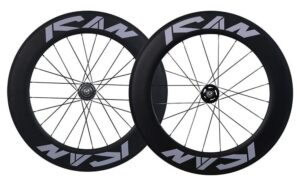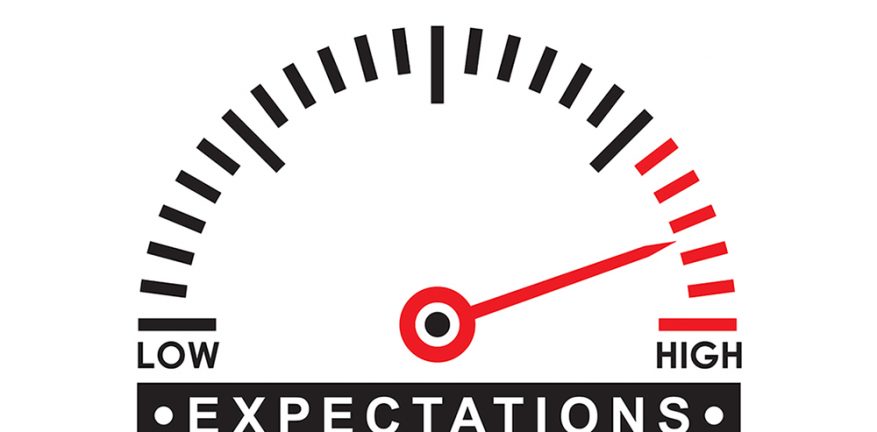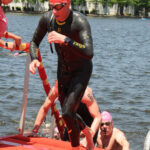In the sixth in my nine-part series exploring obstacles that are blocking your path to your triathlon goals, I showed you how having an attitude of “nothing to lose” will serve you well in your triathlon efforts. In today’s article, I show you how the previous obstacles I discussed in my series can create interfering expectations that further get in your way.
The dictionary defines expectations as “a strong belief that something will happen in the future…a belief that someone will or should achieve something.” At first glance, an expectation seems like a pretty good thing because it suggests that someone is capable of fulfilling the expectation and that they or others have confidence in meeting the expectation. However, upon closer examination, expectations can feel more like a burden on you that actually prevents you from performing your best and meeting the expectation.
thing because it suggests that someone is capable of fulfilling the expectation and that they or others have confidence in meeting the expectation. However, upon closer examination, expectations can feel more like a burden on you that actually prevents you from performing your best and meeting the expectation.
First, expectations have a sense of certainty that you will get a particular result. But, as any triathlete knows, there is little certainty in our sport where external factors (e.g., weather, water, road surface, terrain), equipment failure (e.g., flat tire), and the vagaries of luck (e.g., getting your goggles knocked off during the swim, an unseen pothole), can turn expectations on their head.
Second, with that sense of inevitability comes a feeling of already having fulfilled the expectation. Think of it this way. Go back to when you were, say, eight years old and your birthday was coming up in a few months. There is a present that you want really bad for your birthday, and you tell your parents in no uncertain terms that you want it. In doing so, you create the expectation that you will get the present. For  the several months leading up to your birthday, you think about the present and, in your mind and heart, you already have it. Your birthday arrives and you open your presents only to find that you didn’t get the present you expected. How do you feel? Devastated! Why do you feel so badly? Not because you didn’t get the present, but because in your mind and heart you had already gotten the present and your parents ripped it out of your hands! Therein lies one danger of expectations.
the several months leading up to your birthday, you think about the present and, in your mind and heart, you already have it. Your birthday arrives and you open your presents only to find that you didn’t get the present you expected. How do you feel? Devastated! Why do you feel so badly? Not because you didn’t get the present, but because in your mind and heart you had already gotten the present and your parents ripped it out of your hands! Therein lies one danger of expectations.
Third, there is an implicit threat that lies hidden in every expectation, almost as if there is an invisible “…or else” that can be found at the end of an expectation, for example, “I expect to win…or else I will be terribly embarrassed.” An expectation puts you in a position where you feel that you absolutely must fulfill it or something bad will happen. As a result, expectations create in you in a threat attitude.
Finally, expectations are all-or-nothing propositions; there is no gray area around them. You either fulfill the expectation and succeed or you don’t, and you fail. This means that there is only a small opportunity to succeed and a very large chance of failure.
Expectations and Emotions
When I ask triathletes about expectations, their reactions are pretty much the same. They frown, grimace, and get uncomfortable. They say things like “I hate it when people expect things from me.” and “When I build up expectations about a race, I feel totally weighed down.”
Very powerfully, expectations take a big emotional toll on triathletes. Like the other obstacles I’ve discussed, expectations produce emotional reactions that both feel bad and usually result in poor performances. Before a race, expectations create pressure to fulfill the expectations and fear that you won’t, hurting you both psychologically and physically. During a race, expectations can produce a cautious mindset fueled by fear, a lack of confidence, and an inability to focus. You may perform with tension, tentativeness, and self-consciousness.
discussed, expectations produce emotional reactions that both feel bad and usually result in poor performances. Before a race, expectations create pressure to fulfill the expectations and fear that you won’t, hurting you both psychologically and physically. During a race, expectations can produce a cautious mindset fueled by fear, a lack of confidence, and an inability to focus. You may perform with tension, tentativeness, and self-consciousness.
Your emotional reaction to your expectations after an event are similar to those in response to the other obstacles discussed in my series. If you somehow produce a good result, your strongest emotional reaction will likely be relief because you “dodged the bullet” of unmet expectations. When you perform poorly and don’t fulfill the expectation, you likely will experience devastation because, like the birthday present, the expectation of experiencing success has been ripped out of your hands.
From Expectations to Goals
I hope that I’ve convinced you that expectations will do you no good as you pursue your triathlon goals. But, as I noted earlier in my series, results do matter in our sport and I simply can’t prevent you, as a competitive triathlete in a competitive sport in a competitive culture, from thinking about results. So, my challenge is to allow you to think about results (at least temporarily) but give you a better alternative than expectations. My solution is to have you focus on goals, not expectations. Goals might seem little different than expectations, but they are, in fact, completely different animals.
 Goal setting is actually wired into us and has helped us survive since we were cavepeople 250,000 years ago. Goals have been responsible for many of the great developments that have gotten us to where we are today in modern society. Goals are also deeply rewarding to us. As I’m sure you have experienced, setting, working toward, and achieving goals are a source of immense satisfaction and joy. You feel pride, inspiration, and excitement in putting in the effort and seeing your effort rewarded. Also, unlike expectations and their air of certainty, goals are about the possibility of achievement if you work hard and give your best effort.
Goal setting is actually wired into us and has helped us survive since we were cavepeople 250,000 years ago. Goals have been responsible for many of the great developments that have gotten us to where we are today in modern society. Goals are also deeply rewarding to us. As I’m sure you have experienced, setting, working toward, and achieving goals are a source of immense satisfaction and joy. You feel pride, inspiration, and excitement in putting in the effort and seeing your effort rewarded. Also, unlike expectations and their air of certainty, goals are about the possibility of achievement if you work hard and give your best effort.
One great thing about goals is that they aren’t black and white like expectations, but rather about degree of attainment. Not every goal can be achieved, but there will almost always be improvement toward a goal and that progress defines success. So, if you give your best effort, there is little chance of failure and great opportunity for success. When I ask triathletes about goals, they convey a very different message. Their faces perk up and they say things like, “It means I decide to do something, and I want to work really hard to do it.”
Here’s an example to illustrate the difference between an expectation and a goal. A highly ranked age-group triathlete has the expectation of winning a national championship after finishing fifth the previous year. Or that same triathlete sets a goal of winning a national title. If she ends up finishing third, then she would have failed to meet the expectation. But even though that goal wasn’t fully realized, she still improved her place over the prior year, so she would have succeeded because of the improvement she made.
made.
The emotional experience of goals is also very different from those of expectations. Before a race in which you set goals, you are really motivated and excited to compete because you have a challenge, rather than threat, attitude. After an event, if you succeeded in achieving your goal, you feel elated. But, if you fail to meet your goal, unlike an expectation, you certainly feel disappointed, but you also feel some pride in knowing that you gave it your all and you remain hopeful that you can achieve the goal at the next opportunity.
From Outcome to Process
So, if you’re going to set something related to results, set goals, not expectations. But don’t stop there. There’s another step you must take that will increase your chances of success even more. Once you have established goals for the results you want, immediately shift from outcome to process, and set goals for what you need to do to achieve your outcome goals. Examples might include setting goals to be totally prepared before a race, focusing on a specific race strategy, or deciding to push your limits and seeing what will happen.
There are several key elements about process goals that distinguish them from outcome goals. First, if you achieve the process goals, you are very likely to achieve the outcome goals you set for yourself because you are more likely to perform well. Second, unlike outcome goals, process goals are entirely within your control, so you have the power to act on them or not. Additionally, because they are controllable, you are able to exert control over the quality of your performances and, by extension, the results that you pursue.
Six Phrases That Create Expectations (and Pressure)
Many triathletes I work with don’t even realize when they place expectations on themselves or hear them from others. This is a problem because if you don’t know your setting expectations for yourself, you can’t change them to goals.
There are six phrases I hear from triathletes that are truly cringe-worthy to me because they are big red flags of expectations: I must…, I have to…, I need to…, I should…, I better…, I gotta… Try saying these six phrases out loud and see how you feel. Just saying them causes me to tense up and feel the pressure of expectations on my shoulders. What makes these phrases so unpleasant is that, as I mentioned above, they all are followed by an implicit threat, for example, “I must do well today…or people will think I’m terrible.” What that bad thing is often depends on the meaning you attach to failure (as discussed in the article on fear of failure). But regardless of the specific threat, it feels bad, and it causes you to perform below what you are capable of.
If you become aware that you are using any of these six phrases, you can replace them with much more beneficial alternatives: I would like to…, It is my goal to…., I am working hard to…, I am directing all of my energy to…, and I am excited to…. Now, try saying these five phrases and see how you feel. When I say them, I feel positive, fired up, and motivated, clearly different reactions compared to the six phrases I just described.
Do you want to take the next step in training your mind to perform your best in training and on race day? Here are four options for you:
- Read my latest mental training book: Train Your Mind for Athletic Success: Mental Preparation to Achieve Our sports Goals.
- Listen to my Train Your Mind for Athletic Success
- Take a look at myonline mental training courses.
- Schedule a 1:1 session with me.







